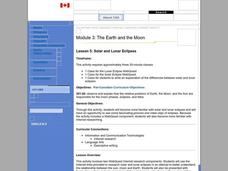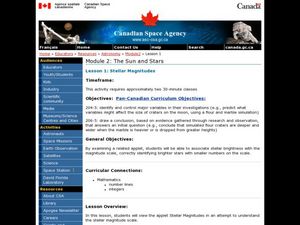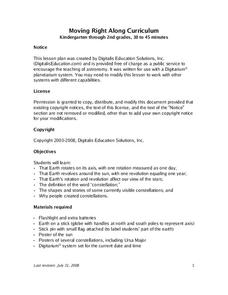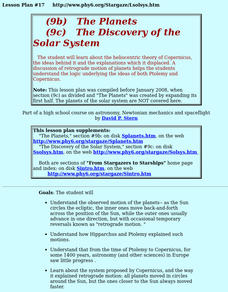Curated OER
Solar and Lunar Eclipses
Young scholars complete a WebQuest in order to better explain solar and lunar eclipses. They observe images and videos of eclipses from around the world.
Curated OER
The Tides
Students experience a computer based applet that explains why the Earth experiences tides.
Curated OER
The Role of the Atmosphere and Greenhouse Effect in Determining the Surface Temperature of the Earth
Students complete research and solve problems that show the factors that determine the temperature of the earth's surface including the effect of greenhouse gases. They look at the relationships between solar energy, atmosphere, and how...
Curated OER
Bringing the Solar System Down to Earth
Students develop a scaled down model of the solar system. In small groups, they calculate the scaled-down diameters of the planets and the sun, the scaled-down distance of the planets from the sun, complete two charts, and create a...
Curated OER
Comets And Meteor Showers
Pupils fill in a diagram of a comet. They listen to a short lecture, view flash animation descriptions of comets and meteors and then use the presented information to complete a worksheet.
Curated OER
Stellar Observations
Ninth graders study the uses of spectroscopy and the operation of the Hubble space telescope. In this astronomy lesson students complete a lab activity that includes graphing star color and temperature.
Curated OER
Building and a sundial
Students create a sundial. In this sundial lesson, students examine the history and use of sundials. Students create a sundial and test their sundial.
Curated OER
Stellar Magnitudes
Learners analyze the stellar magnitude scale. In this stellar magnitude instructional activity, students examine the stellar magnitude scale. Learners predict the Sun's magnitude from various planets.
Curated OER
The amazing and Beautiful Aurora
Students research the aurora. In this aurora lesson, students participate in a webquest about the aurora. Webquest worksheet is included.
Curated OER
The Phases of the Moon
Students sketch the different phases of the moon after exploring them on an internet program. In this moon phases lesson plan, students discuss how the Sun, Earth, and Moon are related.
Curated OER
Solar and Lunar Eclipses
Students examine eclipses. In this eclipse lesson, students investigate solar and lunar eclipses. Students complete a WebQuest and write a descriptive summary of eclipses. Lesson references a WebQuest, but does not include a link.
Curated OER
Planet Interiors
Young scholars compare and contrast the Earth's interior with 2 other planets by looking at images on the computer. In this planet interiors lesson plan, students write a paper about their findings.
Curated OER
SETI WebQuest and the Drake Equation
Students complete a WebQuest where they research the Internet for extraterrestrial intelligence. For this extraterrestrial lesson plan, students also explore how the Drake Equation can predict the occurrence of life elsewhere.
Curated OER
Hubble Space Telescope Webquest
Learners research the Hubble Space Telescope. In this Hubble Space Telescope lesson, students complete a webquest about the Hubble Space Telescope.
Curated OER
Using Star Charts and Maps
Students study star charts and describe locations of objects. In this scientific models lesson students use coordinates and identify characteristics.
Curated OER
Earth's Rotation
Students explore the Earth and its rotation. Volunteers model the sun-Earth system to demonstrate that the Earth rotates around the sun. In groups, students simulate "traveling" around the sun and discuss when it is night and day.
Curated OER
What's Up?
Students compare and contrast the various heavenly bodies found in the sky at night. They identify the moon and stars in the sky as well as how the stars form pictures called constellations. Students also experiment with reflection and...
Curated OER
Starring...Bears!
Students illustrate a First Nations' legend. In this legend of bears lesson plan, students read several legends which involve bears and groups of stars or constellations. After reading, students illustrate portions of the stories....
Curated OER
Working on the Moon
Students take a mission to the moon. In this space science lesson, students visit selected websites to discover information about Earth's moon and the solar system. Students may take virtual missions to the moon and share...
Curated OER
Constellations
Students explore the major constellations. After reviewing the Earth's basic motions and their significance, students discuss the moon's orbit and revolutions. Using a Digitarium Alpha portable planetarium projector, they observe at...
Curated OER
Earth and Beyond!
Pupils investigate one or more of the following topics and develop a plan for the future regarding it: global warming, lunar exploration, space travel, Mars exploration, or terraforming. They disucss the audio files and the video that...
Curated OER
The Discovery of the Solar System
Students study the ideas behind the heliocentric theory of Copernicus. They examine about retrograde motion of the planets as they move around the sun. They study astronomers who include Ptolemy, Copernicus, and Galileo.
Curated OER
The Discovery Of The Solar System
High schoolers study the heliocentric theory of Copernicus, the ideas behind it and the explanations which it displaced. A discussion of retrograde motion of planets helps students explain the logic underlying the ideas of both Ptolemy...
Curated OER
Properties of Dust
High schoolers examine the dust in their classroom and relate it to the dust in space. In this investigative lesson students collect dust and graph their findings.
Other popular searches
- Astronomy and Space Science
- Space Science Astronomy
- Science Astronomy Stars
- Earth Science Astronomy
- Science Astronomy Graphing
- Life Science Astronomy
- "Astronomy and Space Science

























